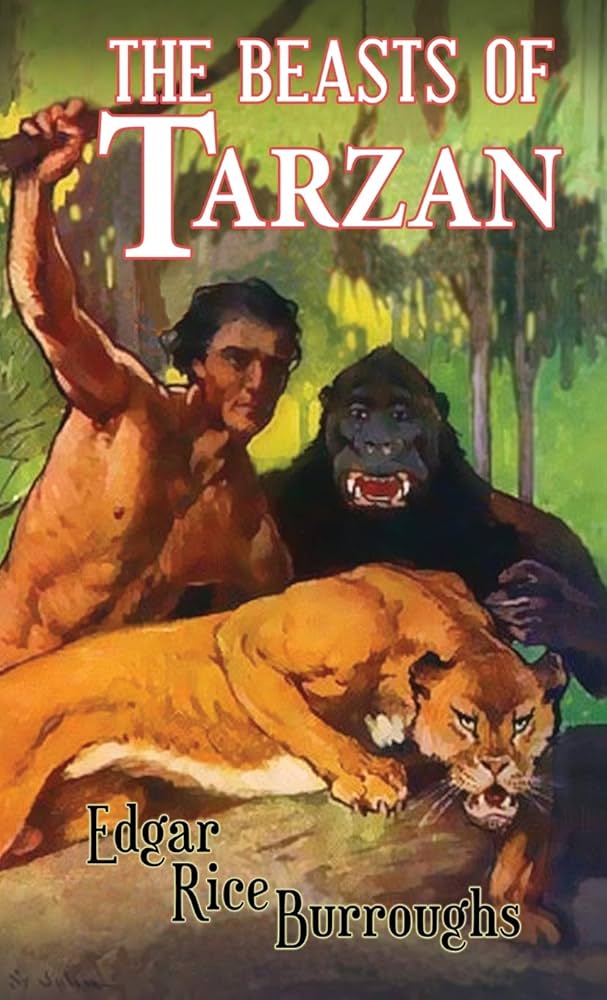Chapter 7 — The beasts of Tarzan
byChapter 7 – The Beasts of Tarzan begins with tension mounting as Kaviri and Mugambi wrestle with the unsettling advance of Tarzan and his feral entourage. Panic spreads through the village as the haunting roars of Sheeta and the bellowing cries of Akut’s apes pierce the jungle. Tarzan’s strategy is precise—drive fear into the hearts of the people not to harm, but to compel cooperation. The villagers, left with no real choice, submit to Tarzan’s will. Though frightened, they recognize his authority as something beyond the ordinary. His blend of silent resolve and the wild power at his command leaves them in awe.
Deeper into the wilderness, the group navigates the banks of the Ugambi River, where village after village appears deserted. The emptiness signals more than fear; it reveals Rokoff’s ongoing influence and the ripples of destruction he leaves behind. Tarzan observes these signs closely, using each clue to sharpen his path. Despite his desire for diplomacy, the tribes’ silence becomes an obstacle. Tarzan pushes forward, knowing every delay could endanger Jane and their child. With every step, his instincts grow sharper, his resolve firmer. He becomes not just a tracker, but a force shaped by love and fury.
One of the chapter’s more ingenious moments emerges when Tarzan impersonates a panther. His ability to mimic Sheeta’s movements and calls confuses the villagers and earns him a temporary advantage. That act isn’t merely a trick—it’s a demonstration of how deeply he understands the jungle and its language. Tarzan’s survival is not just about strength; it’s about adaptability and psychological mastery. The ruse allows him access to shelter and intelligence, though trust remains elusive. The more Tarzan advances, the more layers of danger are revealed. The mention of a group that includes a man, a woman, and a child makes his pursuit urgent and personal. His thoughts never stray far from the fear that Jane and their son could be among them.
For a moment, Tarzan distances himself from his companions to move silently through the jungle. This solitude brings clarity, sharpening his senses and giving space for calculated planning. He listens, not just with ears but with intuition built from a life among the beasts. Tribal camps are read like maps, and tracks are interpreted like spoken language. Even without words, Tarzan communicates—through gesture, gaze, and the aura of power that surrounds him. It is this harmony with the wild that sets him apart from both man and animal. His journey becomes not just physical but deeply spiritual, driven by love and justice.
However, the jungle holds as many traps as truths. One village, appearing open and warm, invites Tarzan to rest. The villagers greet him with food and smiles, masking the intent beneath their hospitality. It is here that Rokoff’s influence reappears—not with swords, but with schemes. The village chief has been bought, and Tarzan’s rest becomes a trap. Tension builds slowly, like a net tightening around an unaware prey. He begins to sense the change too late, and the trap springs into motion. This betrayal is not only painful, but personal.
Tarzan, a figure of trust among wild creatures, finds the deception of men harder to predict. His downfall here is not a failure of strength but of misplaced belief in human decency. As he’s subdued, the depth of Rokoff’s cunning is exposed. Even in captivity, though, Tarzan does not break. His mind remains sharp, already planning how to turn this setback into opportunity. The contrast between his quiet determination and Rokoff’s malice becomes sharper. Each obstacle fuels Tarzan’s inner fire, and though captured, he feels no defeat.
This chapter explores not just adventure, but the psychology of power and survival. It reminds readers that strength lies not only in dominance but in the ability to learn, adapt, and endure. Tarzan’s actions echo timeless themes of trust, deception, and perseverance. His journey is as much about understanding human nature as it is about navigating the jungle. Readers are drawn not just into a wild chase, but into the depths of character transformation. Through fear, loyalty, and betrayal, Tarzan continues to evolve, and the story builds toward a confrontation that will test every fiber of his being.

